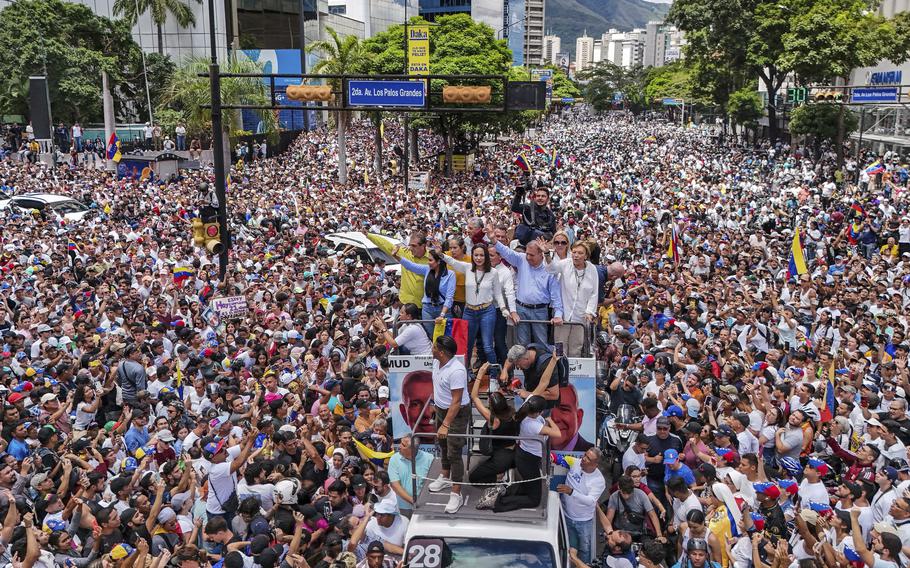
Venezuelan opposition leader Maria Corina Machado and opposition candidate Edmundo Gonzalez ride atop a truck during a protest in Caracas on July 30, 2024. (Matias Delacroix/AP)
A U.N. panel of electoral experts said in a new report that Venezuela’s national electoral authority fell short of following through on basic “transparency and integrity measures that are essential to holding credible elections.”
The panel of four experts, one of the few independent groups invited to Venezuela on the occasion of the July 28 vote, released a report on Tuesday that was not initially expected to be made public. In it, the U.N. experts wrote that the government’s decision to announce an election outcome without publicizing its details “has no precedent in contemporary democratic elections.”
“This had a negative impact on confidence in the outcome announced by the [National Electoral Council] among a large part of the Venezuelan electorate,” the report’s authors wrote.
The report is the latest independent assessment of a presidential election outcome that has been discredited by the United States and other nations who say the evidence clearly shows a victory for the country’s opposition.
The National Electoral Council declared President Nicolás Maduro the winner of the election, with 51 percent of the vote, but refused to release any of the precinct-level results of the election — despite promising and implementing a workflow to do so. The opposition, meanwhile, collected and publicized printouts from voting stations showing that opposition candidate Edmundo González won more than twice as many votes as Maduro.
The U.N. panel of experts said it reviewed a small, publicly available sample of those documents. The printed receipts at polling stations featured QR codes and signatures of officials and agents, security features that the panel said “appear to be very difficult to be fabricated.”
The panel, which was not a formal observation mission, was expected to only report internally to the U.N. secretary general with recommendations for future improvements. It was invited to observe the vote by Venezuela’s electoral council as part of an electoral agreement last year between the country’s government and its opposition, a deal supported with temporary sanctions relief from the United States.
The actual election day was “logistically well organized,” the panel said, and the electoral council was able to detect and quickly resolve “a large majority of small technical glitches that were reported during the day.”
According to the report, the country’s electronic results transmission abruptly stopped in the hours after polls closed, a delay that the electoral council blamed on a terrorist cyberattack. But the panel was not able to independently verify the presence of external attacks because the electoral council postponed and later canceled three post-electoral audits, including on the communication system.
The Atlanta-based Carter Center, which also sent a group of observers to Venezuela’s election, previously said the vote did not meet international standards of electoral integrity and cannot be considered democratic. Jennie Lincoln, head of the Carter Center’s mission in Venezuela, has cast doubt over the possibility of an internet hacking disruption.
Hours before the U.N. report was released, Jorge Rodríguez, head of the government-controlled national assembly, described the U.N. panel as “filled with trash” and criticized its decision to make the report public. He proposed a change in the electoral law to ban international observers in future elections.
“Why do they have to come?” he asked.